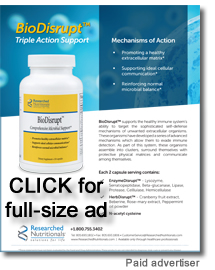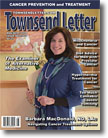|
Page 1, 2, 3
Dr. Barbara MacDonald has twenty-years-experience as a licensed naturopathic physician working in the field of complementary cancer care. She treats patients using a combination of naturopathic medicine, acupuncture, CranioSacral therapy and Qi Gong describing herself as comfortable in both conventional, research-based sciences and the most esoteric healing arts. She practices in Camden, Maine and is the author of The Breast Cancer Companion: A Complementary Care Manual (3rd ed. 2016).
Dr. MacDonald was invited to share how she counsels cancer patients faced with the dilemma of choosing to combine or replace conventional treatment with natural medicine. These are her opinions, to date, and are not intended as medical advice. She is open to learning from those with different experiences even if they kindly disagree with her. "By having integrity with oneself, we make choices that are aligned with our higher purpose."
 Townsend Letter provides a platform for those examining and reporting on functional and integrative medicine. Please support these independent voices. Townsend Letter provides a platform for those examining and reporting on functional and integrative medicine. Please support these independent voices. |
Putting Things in Context
In 2017, there were approximately 1.7 million Americans diagnosed with cancer.1 In the last decade, it is estimated that between 40-90% of them utilized some form of complementary alternative medicine (CAM).2-4 This is a significant increase from the 1990s when it was estimated that only 18% of cancer patients used CAM.5 The term CAM is broad and includes many therapies (massage, acupuncture, etc.), natural products (vitamins, minerals, herbs, nutraceuticals) and practices (meditation, yoga, etc.) that are either added to conventional treatment (complementary or integrative) or done in lieu of them (alternative). Some cancer patients use CAM during treatment but most afterward.6
One concern about relying on research studies is that one person's CAM is doing breathing exercises while another's is following a comprehensive integrative protocol. The category of CAM that  represents the greatest number of users was those who reported having taken "natural products and herbs." Even though 17% of cancer patients used this type of CAM,7 those who simply took echinacea to prevent a cold were lumped in with those who had comprehensive integrative treatment plan prescribed by a licensed CAM healthcare provider. Because the term CAM is so broad, the reliance on research studies to determine its success and failures is flawed. Not all CAM is the same. represents the greatest number of users was those who reported having taken "natural products and herbs." Even though 17% of cancer patients used this type of CAM,7 those who simply took echinacea to prevent a cold were lumped in with those who had comprehensive integrative treatment plan prescribed by a licensed CAM healthcare provider. Because the term CAM is so broad, the reliance on research studies to determine its success and failures is flawed. Not all CAM is the same.
There is a decent body of evidence regarding the safety of herbal and nutraceutical medicines and their interactions with surgery, chemotherapy, radiotherapy and oral medication. I feel confident that licensed naturopathic physicians and many of our medical colleagues trained in functional medicine are versed in guiding patients to avoid things that are unsafe and encourage them to complement their allopathic treatments with natural therapies that often improve their experience and maybe their outcomes. This is very different than patients taking products they read about online without sufficient training to know how to determine quality, safety, or optimal dosing.
What is less known is if natural medicine can replace some or all conventional medical treatment for cancer. Our patients, especially those who are 'naturally minded,' rightly ask us if we can offer them a natural-only cure. I know some holistic practitioners who, I'll call traditional, perhaps even radical and certainly the most risk-tolerant among us, comfortably answer that question with a yes. I, and most of the naturopathic oncology colleagues I consulted for this article, rarely do. I generally discourage the alternative-medicine-only option around 85% of the time.
Only recently have outcome studies compared the use of alternative medicines to allopathic. In a case-control, retrospective study published in August 2017, in the Journal of the National Cancer Institute, it was found that those who did alternative-treatment-methods-only were more than twice as likely to die compared to those who chose conventional treatments.8 Conducted at Yale University School of Medicine, 281 cases were identified where patients with colon, breast, prostate and colorectal cancers responded that they had chosen "other-unproven cancer treatments" instead of allopathic medicine. Their outcomes were compared to those with similar cancers, stages, etc. In one article about this study the authors stated, "Overall, 78% of people having conventional treatment for cancer survived at least five years, compared to only 55% of people having alternative treatment alone. The difference was biggest for breast cancer, where people who chose alternative therapies were more than five times as likely to die within five years as those who chose conventional treatments."9 This is concerning. Yet again, the study doesn't discern between those who had a comprehensive, practitioner-prescribed treatment plan from those who directed their own care. The patients could have taken one capsules of curcumin or they could have engaged in a long-term, individualized, holistic approach including diet, fitness, meditation, acupuncture, hyperbaric, intravenous medicine, herbal therapy, etc. Not all CAM is the same and well-designed alternative medicine studies are non-existent.
In 1997, I graduated with a four-year doctoral degree in naturopathic medicine and, in 2003, a master's degree in classical Chinese medicine. I then had the privilege of practicing for thirteen years, mentored by women's natural health expert Dr. Tori Hudson and Chinese herbalist Dr. Menge Kou. In the early years, I believed that by eating well, taking natural medicines and addressing mental, emotional, and energetic imbalances, one could cure their cancer. I believed in the theory that our body, restored to balance, would recognize unhealthy mutations and direct the immune system to do what it knows to do – stop cancer cells from replicating and bring them back from the 'dark side' to being productive members of the community of cells working toward the greater good within each of us.
I still believe this in theory. I was raised by a now-retired osteopathic physician, who instilled in me a belief in the healing power of our inner physician. Through my own failures and those of my most respected colleagues, I have learned that theory isn't enough. The practice of knowing which combination of natural therapeutics, lifestyle changes, and mental-emotional shifts to recommend for each person's unique situation, at a pace to turn the tides of cancer has, so far, been like using a sailboat to chase a speed boat. I have met individuals who had all the factors in alignment to achieve this. Unfortunately, they are not the norm. They are the miracles. I say this not to squelch the faith of those who believe that natural-only can work. I realize that, for some, it will, and I have the deepest respect for patient choice. I and my dedicated colleagues have, however, attended too many funerals held in honor of beloved patients who were clinging to the faith that the natural-only option would save them while denying potentially life-prolonging conventional medical treatments. Therapies that might have given the natural options more time to work. On the other hand, patients have suffered, and some have died due to side effects from unnecessary surgeries and drug treatments. It is all about timing and balance.
I am however, very confident in the use of well-designed complementary or integrative approaches that pair the best of both worlds. These would include properly timed, natural medicines used in therapeutic dosages along with individually chosen diet therapies, mental-emotional healing, stress management, and energetic balancing to work in tandem toward a cure with carefully chosen and safely dosed conventional allopathic procedures and medicines. The success at facilitating remission is especially high, in my observations, under the care of our medical colleagues who use methods that reach beyond what is possible in our country today. In Europe, some oncologists are individualizing treatments using a host of conventional and natural methods combined. They are, however, not yet approved by the FDA to be used in this country.
After all these years, I am not confident in the success rates among those who forgo all forms of conventional medicine. What I feel deflated by is that we do not yet have reproduceable natural treatment protocols to offer as an alternative to conventional medical treatment. This is due, in part, to the limitations placed on medical and naturopathic physicians in our county. We don't have a body of research that proves our methods work, nor do we know when to use which form of natural medicine. Reading about those who claim to have better success than the MD-only options, I react with a blend of healthy skepticism and hope. I realize I may be scorned by my own people here: colleagues who may have a patient or perhaps several, who, under their care, found a cure or extension of life with a natural-only approach. I pray that you succeed, but to date, this is where I believe we are. Without repeatable and trainable methods, we are left to advise patients to find the balance between conventional and natural. Perhaps the burgeoning science of immunotherapy is what we've been waiting for – using the healing power of our own immune system with help from sophisticated science, and yes, the capitalist-driven machine of conventional medicine, to bring about a much-needed cure for cancer that works with our body's wisdom. I could get on board with that. But, then again, I was raised by folks who believe in unicorns and won't give up looking for the natural-only holistic approach that works.
I am proud of the state of my profession's offerings in complementary treatment during conventional cancer therapies. I strongly recommend that patients seek this form of care and wish patients had more access to holistic care at their cancer clinics. But, while we are getting closer every year to the alternative, natural-only options that we desperately want to provide, I encourage patients to think carefully before embarking on that journey.
Decision Making
If you are among those recently diagnosed with cancer, your thoughts and feelings, questions and concerns, your left brain, your right, your logic and your intuition all matter. While this will affect those who love you, it is your experience, no one else's. You get to call the shots even if it might not feel that way.
The rest of this article is intended to help you navigate cancer treatment decisions if you are considering the addition of natural medicine along with conventional medical treatment or instead of it. That defines the difference between complementary (a.k.a. integrative) vs. alternative medicine. Even though you are likely mentally and emotionally overwhelmed by your recent diagnosis and conventional treatment options, the goal is to feel confident about the forms of natural medicines their dosage, timing and sources you choose.
So, how do you find confidence in your plan when you are new at this and the stakes are high? Finding answers to the following questions, may help you organize your thoughts.
- First, how much time do you have to make an informed decision?
- Second, what choices do you have?
- Third, if you choose a complementary or alternative path, where will you get the expertise you need to guide you?
- Fourth, if you choose a complementary path, what type of natural medicine is best for you?
- Fifth, if you are leaning toward an alternative path, what should you be thinking about?
- Lastly, how can you comfortably work within the conventional medical system even if you choose CAM?
Page 1, 2, 3
|
![]()
![]()
![]()
![]()






